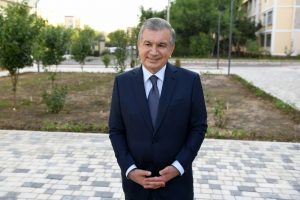The question of whether Uzbek President Shavkat Mirziyoyev will face a genuine opposition challenger in the upcoming October election is increasingly a solid “no.” While it was always a long shot to even suggest an opposition party and candidate would be approved to run against the sitting Uzbek president, a handful of Uzbeks had stepped forward to throw their hats in the ring.
The system has tossed those hats right out.
A well-known Uzbek singer, Jahongir Otajonov, has quit the race, according to RFE/RL.
Otajonov had declared his intention to run in January. He was named a presidential candidate by the Erk party in April. But Erk remains banned in Uzbekistan and another budding opposition party, Khidirnazar Allaqulov’s Haqiqat va Taraqqiyot (Truth and Progress) Social Democratic Party, was twice denied registration.
The last time an Uzbek president faced a serious challenger, one seen as legitimate rather than a Potemkin candidate, was in 1991. In that election, Islam Karimov — who had become president of the Uzbek Soviet Socialist Republic the previous year — faced off against Muhammad Solih, a poet and the founder of Erk. The contest, viewed as heavily rigged in Karimov’s favor, was the only time Karimov took less than 90 percent of the vote in the final count.
Erk was banned in the 1990s and Solih driven into exile.
In 1999, a series of bombings rocked Tashkent. In the aftermath, the Uzbek government alleged that bombings were an assassination attempt on Karimov carried out by the Islamic Movement of Uzbekistan (IMU). It also alleged the plot was concocted with Solih. He was tried on extremism charges in absentia and sentenced to 15 years in prison, effectively banning him from ever returning to the country. His brother, Muhammad Bekjanov, was kidnapped in Ukraine and returned to Uzbekistan, where he was sentenced to 15 years. He eventually spent nearly 18 years in prison before being released in 2017.
Erk leaders hoped to reregister the party in the relatively more open Mirziyoyev era. But the waves of reform have yet to effectively touch the political arena. In January 2020, however, a party delegation met with the Uzbek Ministry of Justice, which reportedly told them, “This party is part of the past, forget about it.”
If Erk was the past, Allaqulov’s Truth and Progress Party hoped to be the future. Neither has had much luck and both have faced pressure. As Bruce Pannier catalogued recently, the way has been cleared for Mirziyoyev’s reelection. Although a spokesman, in Pannier’s words, attempted to “generate some suspense” by suggesting that he was unsure if Mirziyoyev would run for reelection, “Everyone expects Mirziyoev to handily win a second term in office.” Pannier recounts past efforts by opposition figures to contest the presidency at the ballot box, with many diverted by criminal charges ahead of election day or otherwise dissuaded.
The contemporary race appears no different. After stating his intention to run in January 2020, Otajonov was threatened in Turkey, where he was living at the time, by unknown individuals that told him a bounty had been put on his head. After returning to Uzbekistan, and receiving the Erk nomination, a mob of people forced their way into his home where the party was meeting. Party members were summoned by police in June, but not to give statements about the mob — instead they were questioned about relations with the Erk party’s founders.
To announce he was quitting the race, Otajonov reportedly posted a statement to Instagram on July 10, which outlined the kind of pressure that pushed him out: “Every [online political] stream of mine cuts my mom’s life by five years. The tears of my parents they shed every day is too much for me. What’s the point of being a president if something bad happens to them? I want to extend my apologies to the people as I am quitting political activities for now.”
RFE/RL reported that the statement disappeared two days later, writing, “It was not clear if Otajonov had removed it, or Uzbek if authorities had blocked it to avoid speculation about pressure being imposed on him.”
Threatening, directly or obliquely, the relatives of political opponents and activists is standard practice across authoritarian systems.
Three months from election day — October 24 — and the path is indeed cleared for Mirziyoyev. Arguably, he would win even in a “fair” fight, but why risk it?

































